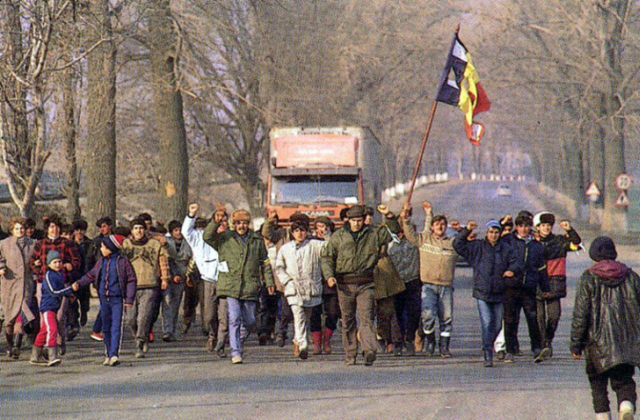The Romanian Revolution in Iasi
In early December 1989, the north-eastern city of Iasi was preparing for a face off with Ceausescus regime.

Steliu Lambru, 16.12.2013, 13:17
If there is a city that symbolizes the Romanian Revolution of 1989, it is Timisoara. On December 16th, its citizens decided that Romania had to change, that it could not stay the same while elsewhere in the communist bloc changes could not be stopped. With courage, determination and sheer heroism, people took to the streets to shout out their desire for freedom and a better life.
On the opposite side of the country, another city, Iasi, was preparing for a face off with Ceausescu’s regime. In the 1980s, a protest movement had formed there, made up of writers Dan Petrescu, Tereza Petrescu, Luca Pitu and Alexandru Calinescu. On 12 December 1989, economist Stefan Prutianu, with a few other Iasi intellectuals making up the Romanian Popular Front, spread out fliers in the city, summoning the people to a large protest march in Unirii Square, scheduled on December 14, at 16:00 hours. Since they were already under political police surveillance, they were arrested 10 hours before the demonstration. The first man arrested during the Romanian Revolution was Stefan Prutianu, the author of the proclamation written on the fliers. He taught economics at Cuza University in Iasi, and he told us that he expected to get arrested that day.
Groups of police, national guards and political police filled the square, and started arresting people by the dozen. The revolution in Iasi was smothered before it started. Historian Adrian Cioroianu, dean of the School of History of the Bucharest University, told us he believed that the revolution was bound to start not in the capital, but in a city close to a border, where there was stronger motivation to imitate Romania’s neighbors. Both Iasi and Timisoara fit the model proposed by Cioroianu:
Adrian Cioroianu: “I would point out a detail that meant that anti-Ceausescu movements were bound to happen in eccentric cities, close to our neighbors. Russia was the former USSR back then. Geographically, Iasi was closer to the eastern border and the former Soviet Republic of Moldova, where things were further down the road in terms of perestroika. Timisoara was similarly placed, but at the western border, so an authentic revolution might have broken out in Iasi as easily as it did in Timisoara. After all, Iasi was a center of protest, at least intellectuals there had already shown publicly opposition to the regime, which we only found out about after 1990. But protests may not have had the critical mass in Timisoara. In that city, the multitude of ethnicities and creeds was more suited to a protest engaging various religions and confessions, including Romanians. If Romanians had not come out into the streets in Timisoara, Ceausescu would have had the excuse of saying that this was foreign interference, which he did anyhow. The fact that Romanians protested in Timisoara gave a national and global nuance to this protest. What happened in Iasi is notable, but upon deeper analysis we can conclude that the best suited city for the revolution was a western one, like Timisoara.”
Timisoara spoke to the entire world of the aspirations of Romanians, and Adrian Cioroianu told us why Iasi did not have the advantage:
Adrian Cioroianu: “It lacked the seed of discontent, such as Tokes in Timisoara. We have to accept the fact that revolutions are not started by intellectuals. Intellectuals prepare them, but if they don’t have massive popular support, they don’t have much strength by themselves. The Tokes element gave the movement in Timisoara a combination of Romanian and Hungarian forces that was joined by the Germans and Serbians in the area, and the world was much more sensitive to the matter. When I say ‘the world’ I mean Western Europe as it was back then. This brought to an end the Ceausescu regime, which had been accused for a decade of anti-Hungarian and anti-German policies, by attempting to create uniformity in the country. From this point of view, Timisoara had an advantage that Iasi and other cities in the country did not.”
The Romanian revolution in Iasi resulted from a conspiracy of people who could not stand how things were any more, and the whole of society contributed tacitly. Timisoara and Bucharest are the cities where Romanians claimed their freedom, but the city of Iasi did not hesitate to respond to the signal that Romania’s future had to change.






























